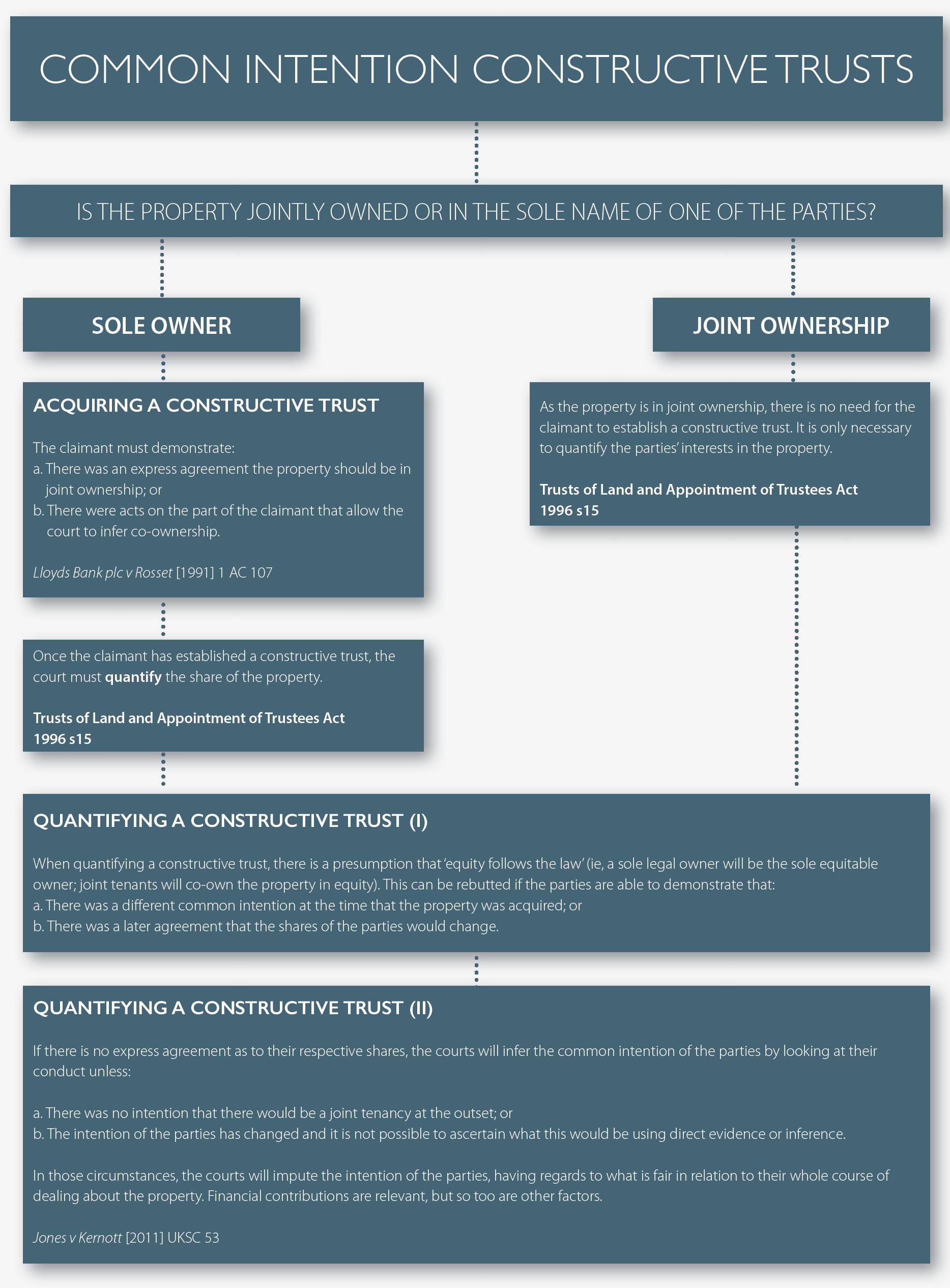The Connection Between What Is A Constructive Trust and Equitable Relief
Wiki Article
Discovering Just How Does a Positive Trust Job in Residential Property and Property Disputes
The principle of a positive depend on acts as an essential device within property and possession disagreements, addressing situations where one event has unjustly benefited at the cost of another. This fair remedy not only looks for to fix injustices but additionally stresses the relevance of objective and contribution in identifying rightful ownership. By checking out the subtleties of exactly how useful depends on operate, one can discover the complexities that typically develop in legal contexts. What implications do these counts on hold for future disagreements, and exactly how might they influence the landscape of property law?
Interpretation of Constructive Depend On
A useful count on develops when a court identifies that it is essential to avoid unjust enrichment, often in circumstances where an event has acquired residential or commercial property via wrongful means or under scenarios that necessitate equitable alleviation. This lawful remedy is not officially developed by the parties involved; rather, it is enforced by the court to attend to situations where fairness and justice demand intervention.Positive trust funds are frequently conjured up in cases entailing fraudulence, breach of fiduciary responsibility, or other kinds of transgression. If a private wrongfully takes belongings of property that truly belongs to an additional, the court might impose a useful count on to guarantee that the culprit holds the residential property for the advantage of the rightful owner. This legal concept operates the concept that it would be inequitable for the offender to retain the advantages originated from their transgression.
Eventually, a constructive trust functions as a powerful tool in residential property conflicts, reinforcing the idea that ownership need to show not only legal title yet likewise honest factors to consider. By identifying the need for fair relief, courts make certain that justice dominates in the distribution of residential or commercial property and possessions.
Key Principles of Useful Counts On
While the application of positive counts on might vary relying on certain situations, numerous vital concepts regularly underpin their enforcement in property conflicts. The concept of unjust enrichment plays a critical role; a constructive depend on is frequently enforced to stop one event from unfairly benefiting at the expenditure of one more. This concept underscores the fair nature of constructive depends on, stressing that legal ownership does not always equate to rightful ownership.Secondly, the requirement of a fiduciary connection is substantial. What Is A Constructive Trust. Positive trusts regularly occur in contexts where one celebration has an obligation to act in the most effective interests of another, such as in partnerships or joint ventures. Breaches of this duty can set off the imposition of a useful depend secure the hurt event's passions
In addition, the teaching of intention is crucial, as courts consider whether the parties planned to develop a trust-like connection, even if not formally recorded. Lastly, the concept of fair solutions highlights that useful counts on serve to give alleviation that lines up with fairness and justice, ensuring that the rightful plaintiff can gain back building or possessions that they are entitled to, despite legal title residing in other places.
Applications in Residential Property Disputes
Useful trusts find substantial application in home disagreements, especially when attending to problems of possession and fair rights. These depends on arise in circumstances where one celebration holds property under conditions that, in fairness and justice, need to benefit one more celebration. The fair remedy of a useful trust avoids unjustified enrichment by acknowledging the payments of a party who, in spite of doing not have official title, has a genuine insurance claim to the home.One usual situation includes cohabiting companions that add to the procurement or maintenance of residential property yet are out the title action. In such situations, the courts may impose a constructive depend mirror the celebrations' contributions and intentions, thus making certain that the non-titled companion gets a fair share of the building.
Additionally, constructive trusts can be crucial in disputes including inheritance or family home, where a decedent's intent may not have actually been officially documented. Courts may infer a positive trust fund to recognize the decedent's desires and correct potential injustices amongst successors. Generally, constructive trusts offer as an essential device in balancing civil liberties and guaranteeing equitable end results in home disputes, strengthening the concept that fairness need to prevail in possession matters.
Study and Instances
Residential property conflicts involving constructive depends on can frequently be highlighted through real-life case research studies that highlight the complexities and nuances of fair rights. One remarkable case is * Gissing v. Gissing *, where a wife declared an advantageous interest in the household home, saying that her financial contributions throughout the marriage required a positive trust. The court ultimately regulationed in her favor, establishing that her payments produced a fair rate of interest in spite of the residential or commercial property being exclusively in her partner's name.Another illustrative situation is * Thompson v. Thompson *, where brother or sisters challenged the possession of a family estate after their parents' passing away. One brother or sister had preserved and boosted the residential property, insisting that these activities validated a constructive count on. The court recognized the brother or sister's initiatives and found that a constructive count on was required to stop unjust enrichment, therefore awarding them a share in the estate.
These cases exemplify how positive trusts serve to address scenarios where legal next page possession does not show the true sites equitable interests of the celebrations included, highlighting the significance of intent and contributions in identifying rightful cases in residential or commercial property conflicts.
Lawful Implications and Factors To Consider
When attending to useful trust funds in home disagreements,Various lawful implications and considerations develop. Foremost, the establishment of a constructive trust fund normally depends upon the existence of an unfair enrichment, in which one celebration advantages at the expenditure of an additional. This concept necessitates a thorough evaluation of the connection in between the events and the circumstances that caused the claimed injustice.In addition, courts commonly call for clear proof of the complaintant's payment to the residential or commercial property or property concerned, which can consist of economic investments, labor, or various other kinds of support. The burden of proof relaxes with the complaintant, demanding thorough documentation and testament to confirm their claims.
Furthermore, the timing of claims is vital, as laws of limitations important source may limit the capacity to develop a useful count on after a specific period. Lawful advice should navigate these time constraints carefully to ensure that cases are filed in a timely fashion.
Finally, the potential for disagreements over the intent behind property transfers can make complex matters further, demanding a nuanced understanding of both statutory regulation and situation law to properly promote for a client's rate of interests in useful count on cases.
Final Thought

The concept of a useful trust serves as an essential device within building and asset conflicts, resolving situations where one event has unfairly profited at the expenditure of an additional. If a specific wrongfully takes belongings of building that truly belongs to another, the court may enforce a constructive count on to make sure that the wrongdoer holds the home for the benefit of the rightful owner.Useful depends on discover considerable application in home disagreements, specifically when resolving concerns of possession and equitable civil liberties. On the whole, constructive trusts offer as a crucial device in balancing rights and guaranteeing fair results in home conflicts, strengthening the principle that fairness must dominate in ownership matters.
In recap, positive depends on serve as crucial fair treatments in home and asset disagreements, addressing unjust enrichment by identifying the contributions of parties entailed. - What Is A Constructive Trust
Report this wiki page